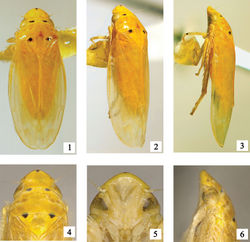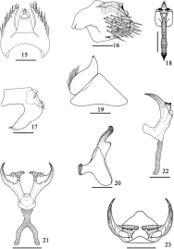Bambusimukaria quinquepunctata
| Notice: | This page is derived from the original publication listed below, whose author(s) should always be credited. Further contributors may edit and improve the content of this page and, consequently, need to be credited as well (see page history). Any assessment of factual correctness requires a careful review of the original article as well as of subsequent contributions.
If you are uncertain whether your planned contribution is correct or not, we suggest that you use the associated discussion page instead of editing the page directly. This page should be cited as follows (rationale):
Citation formats to copy and paste
BibTeX: @article{Yang2016ZooKeys, RIS/ Endnote: TY - JOUR Wikipedia/ Citizendium: <ref name="Yang2016ZooKeys">{{Citation See also the citation download page at the journal. |
Ordo: Hemiptera
Familia: Cicadellidae
Genus: Bambusimukaria
Name
Bambusimukaria quinquepunctata Yang & Chen & Li, 2016 sp. n. – Wikispecies link – ZooBank link – Pensoft Profile
- Bambusimukaria quinquepunctatus, in press, Chen et al. (2012)[1].
Type material
Holotype: ♂, China: Forest Park (26°35'N, 106°42') (1100 m), Guiyang, Guizhou, on bamboo (Phyllostachys bambusoides), 11 Aug. 2006, X.-S. Chen and L. Yang; paratypes: 4♂♂, 7♀♀, data same as holotype; 1♀, Dongtang (25°24'N, 107°52'), Maolan, Libo, Guizhou, on bamboo, 24 May 1998, X.-S. Chen; 10♀♀, Dayi (25°21'N, 106°06'), Wangmo, Guizhou, on bamboo (Phyllostachys bambusoides), 28 July 1998, X.-S. Chen; 25♂♂, 6♀♀, Forest Park, Guiyang, Guizhou, on bamboo, 11 July 2006, Q.-Z. Song; 1♀, Weiyuan (26°01'N, 106°31'), Changshun, Guizhou, on bamboo, 11 July 2007, X.-S. Chen; 6♀♀, Daxianfeng (26°55'N, 116°59'), Datian, Sanming, Fujian, on bamboo, 14 May 2011, Z.-M. Chang and J.-K. Long; 5♀♀, Tianyanbao (26°39'N, 118°53'), Yongan, Fujian, on bamboo, 17 May 2011, Z.-M. Chang and W.-C. Yang. All types are deposited in IEGU except two males and two females deposited in BMNH where indicated.
Diagnosis
General color yellowish white to yellowish orange. Head and thorax with five black markings. Female sternite VII with two blackish brown markings. Anal (Xth) segment with a very large process at apical-ventral margin. Aedeagus with shafts diverging from base, each shaft narrower at base, broad to near apex, outer margin extended apically into a stout acute process inner margin with a stout subapical tooth-like process directed medially, dentate on dorsal suface, gonopores subapical on ventral surface.
Description
Measurements. Body length including forewing: male 5.30–5.40 mm (n = 30), female 5.50–5.60 mm (n = 36).
Coloration. General color yellowish white to yellowish orange (Figs 1–6, 26, 27). Eyes yellowish brown. Head and thorax (Figs 4, 7) with five black markings, one at apex of crown, two on anterior margin of pronotum and two on anterior margin of mesonotum. Fore tibia with one dark brown mark subapically. Female sternite VII with two blackish brown markings (Fig. 12).
Head and thorax. Crown (Figs 4, 7) with median length shorter than width between eyes (0.62:1). Face including eyes (Fig. 5) slightly shorter in middle line than broad at widest part (0.81:1). Pronotum (Figs 4, 7) wider than head including eyes (1.17:1), longer than vertex in middle line (1.48:1). Scutellum (Figs 4, 7) as long as pronotum in middle. Forewing (Fig. 9) 3.4 times longer in middle line than widest part. Hindwing (Fig. 10) 2.13 times longer in middle than widest part.
Male genitalia. Anal (Xth) segment (Figs 15–18) with a very large process at apical-ventral margin, directed cephalad, tapering distally to acute apex. Pygofer (Figs 15, 16) broad and rounded in lateral view, with many macrosetae. Valve (Fig. 19) with basal width 2 times longer than median length, posterior margin rounded. Subgenital plate (Fig. 19) very short, broad at base, tapering to acutely rounded apex. Style apophysis (Fig. 20) thumb-like, slightly sinuate, apex rounded. Connective stem (Figs 21, 22) slightly shorter than arms, fused with base of aedeagus. Aedeagus (Figs 21–23) in ventral view with shafts diverging from base, each shaft narrower at base, broad to near apex, outer margin extended apically into a stout acute process inner margin with a stout subapical tooth-like process directed medially, dentate on dorsal suface, gonopores subapical on ventral surface.
Female genitalia. Sternite VII (Fig. 12) with anterior margin angularly produced laterally, posterior margin strongly and broadly concaved. First and second valvulae (Fig. 13a, b) as in generic description; second valvulae (Fig. 14a, b) bearing approximately 36 fine teeth on apical half behind dorsal prominence and basal curvature.
Host plant
Bamboo (Phyllostachys bambusoides f. lacrimadeae Keng et Wen) (Figs 24–27).
Distribution
Southwest and south China (Guizhou, Fujian).
Etymology
The name is a combination of the Latin words “quinque” (five) and “punctata” (spots), which refers to the dorsum of head and thorax with five small dark spots.
Remarks
The new species can be distinguished from other species of Mukariini by the very large anal tube process.
Original Description
- Yang, L; Chen, X; Li, Z; 2016: Bambusimukaria, a new bamboo-feeding leafhopper genus from China, with description of one new species (Hemiptera, Cicadellidae, Deltocephalinae, Mukariini) ZooKeys, (563): 21-32. doi
Images
|
Other References
- ↑ Chen X, Yang L, Li Z (2012) Bamboo-feeding leafhoppers in China. China Forestry Publishing House, Beijing, 218 pp. [In Chinese with English summary]



